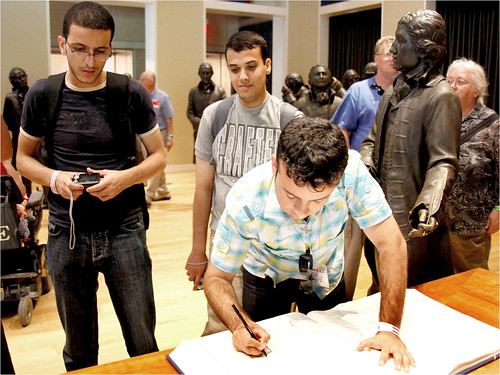This summer Temple was host to the first of two five-week seminars on religious pluralism.

The Dialogue Institute at Temple, along with the International Center for Contemporary Education, hosted the first of two five-week seminars on religious pluralism from July 3 to Aug. 7.
After sending in a proposal a year ago, the U.S. Department of State passed the program, which brought in 17 students from Egypt, Lebanon and Iraq. They spent the first four weeks in Philadelphia and the last week taking study tours.
Professor of Catholic Thought and Interreligious Dialogue Dr. Leonard Swidler, the founder and president of the Dialogue Institute, along with Director Dr. Julia Sheetz-Willard, explained the objectives and fundamentals of the seminar.
“The seminar is part of a larger project that the State Department does, called the Study of the U.S. Institutes for Student Leaders,” Sheetz-Willard said. “There are different topics, and they are all intended to introduce students to American history and democracy, but through the lens of a particular topic.”
According to the Dialogue Institute’s website, some of the program’s goals include: broadening participants’ knowledge of U.S. democracy and religious freedom, introducing and explaining an array of religious practices and presenting students to the practice of interfaith dialogue.
Swidler and Sheetz-Willard agreed that although the students did not always agree with one another, everyone was positive about the experience.
“The students obviously had the perspectives of their home context,” Sheetz-Willard said. “Because of the politics of the Middle East, many of the students had never been in the same room with someone who was Jewish, let alone sit and have a conversation.”
During the seminar, the students took a trip to a synagogue in the suburbs where the Rabbi explained Judaism to the students.
“Simply meeting Jews in a religious context was a mind-blowing experience,” Swidler said. “That doesn’t mean they all went home and voted pro-Israel. That means whatever happened here moved them away from these kinds of positions to a more tolerant kind of position.”
Hillel, the Foundation for Jewish Campus Life, put together a program with the Dialogue Institute. Hillel is one of the Dialogue Institute’s American Partners, which include eight to 10 undergraduate students from Philadelphia universities, the Muslim Student Association, the Rumi Student Association, the religion club and host families.
Phil Nordlinger, the director of Hillel at Temple, said the dialogue was successful.
“Our students that we had recruited interacted very nicely with the students from the Middle Eastern countries,” Nordlinger said. “And the students from those countries were very inquisitive about Judaism.”
The program consisted of a dinner at which the students from the Middle East shared presentations about their native countries. Afterwards, the Muslim, Jewish and Christian students spoke about religious pluralism and beliefs.
“What I found was there was really a lack of understanding about Judaism and Jewish beliefs,” Nordlinger said. “Once we discussed it, and they asked their questions, they were very polite, and had some very insightful comments to make.”
Sheetz-Willard said one of the most affected students was a Kurd from Iraq, who had a special tour of the Holocaust Museum in Washington, D.C., one of several travel destinations during the final week.
“This student was so struck by the whole experience, and really, most of them had been told that the Holocaust didn’t even happen, or they had very skewed ideas about it,” Sheetz-Willard said. “He made the connection between the experience of the Kurds in Iraq, the genocide perpetrated by Sudan with chemical warfare, and really got the connection when religious and ethnic hatred leads to that extreme.”
Both Sheetz-Willard and Swidler said this particular student spoke of applying for a scholarship to come back and do research at the Holocaust Institute. They said he also planned to establish a center for dialogue in the Kurdish section of present-day Iraq.
Each student was required to develop an action plan related to religious pluralism, that they could employ in their home countries.
“We see the movement building,” Sheetz-Willard said. “It’s very exciting to work with these young people because you feel like, yes, in some ways their ideas are already very entrenched, yet they have plenty of time to grow.
Swidler, who said he would rate the program a 10.5 out of 10 on a scale of success, said next summer, students from Saudi Arabia will be coming as well.
“The hope is that this is not going to be simply a learning experience for these students,” Swidler said, “but it’s going to have some kind of ripple effect.”
Cary Carr can be reached at cary.carr@temple.edu.


Be the first to comment